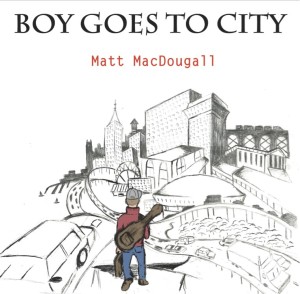Features Dave Matthews Band Saxophonist Jeff Coffin
Second Album Blends Jazz, Rock, Country & Folk Influences Discovered Between Nova Scotia and Music City
 The story of a small-town kid making his way to the big city to seek his fortune is a timeless one, applicable to each new generation of dreamers. On his risk-taking second album, Boy Goes To City (due out [date]), guitarist Matt MacDougall traces his own journey from Canada’s far-flung Maritime Provinces to the mecca of Music City, U.S.A. A native of Nova Scotia, MacDougall arrived in Nashville, Tennessee by way of Indiana University’s Jacobs School of Music. Along the way he’s picked up influences from country, rock, hip-hop and Brazilian music, all of which can be heard in his own diverse approach to jazz.
The story of a small-town kid making his way to the big city to seek his fortune is a timeless one, applicable to each new generation of dreamers. On his risk-taking second album, Boy Goes To City (due out [date]), guitarist Matt MacDougall traces his own journey from Canada’s far-flung Maritime Provinces to the mecca of Music City, U.S.A. A native of Nova Scotia, MacDougall arrived in Nashville, Tennessee by way of Indiana University’s Jacobs School of Music. Along the way he’s picked up influences from country, rock, hip-hop and Brazilian music, all of which can be heard in his own diverse approach to jazz.
Boy Goes To City arrives one year after MacDougall planted his roots in the fertile musical soil of Nashville, and features a stellar band picked up along the way. The album features saxophonist Jeff Coffin, a staple of the Nashville jazz scene best known for his indefatigable touring with Bela Fleck & The Flecktones and the Dave Matthews Band; local bass guru Roy Vogt, who has worked with the likes of Jerry Reed and the Allman Brothers Band’s Dickey Betts; and three IU classmates and longtime collaborators: saxophonist Adam Carrillo, keyboardist Alex Wignall, and drummer (and wife) Arianna Fanning.
The eclecticism to be found on Boy Goes To City is certainly a reflection of Nashville’s inclusive music scene, where a stroll down Lower Broadway offers a kaleidoscope of sounds emanating from every bar and juke joint on the strip. “Nashville being the diverse musical community that it is,” MacDougall says, “I’ve played a lot of jazz since I’ve been down here but I’ve done a heck of a lot of other stuff as well. Absorbing the atmosphere and what other musicians are playing over the last year is evident in these compositions.”
But MacDougall’s wide-ranging tastes hardly began only when he arrived down south. As a teenager, he was first attracted to alternative and hard rock bands like Nirvana, Metallica, and Guns N’ Roses. But his ears were really opened when his listening strayed to more folk-influenced artists including Neil Young, Bob Dylan, and Crosby Stills & Nash, whose grounding in traditional American music served as an ideal primer for the young guitarist’s future endeavors. “From the instant that I started to figure these tunes out I was hooked,” he recalls. “It didn’t take me long at all to gravitate towards music with a little more of a complex edge to it.”
While studying finger-style guitar, MacDougall stumbled across Chet Atkins’ cover of Dave Brubeck’s immortal “Take Five,” immediately instilling a fascination for jazz. He followed that thread backwards to Charlie Parker and Dizzy Gillespie and forward to Pat Metheny and Keith Jarrett. He dug deeper as he entered the jazz program at Nova Scotia’s St. Francis Xavier University, where he was mentored by guitarist/composer Kevin Brunkhorst and trumpeter Paul Tynan.
While still at St. FX, as the school is nicknamed, MacDougall recorded his 2012 debut album, Familiar Faces, which features Tynan. The album achieved some impressive accolades, including a Jazz Recording of the Year nomination for Canada’s East Coast Music Awards. But MacDougall was already looking to expand out of the album’s modern jazz sound into more adventurous territory, and by the end of the year he’d arrived in Bloomington, Indiana, where he would study with guitar greats Dave Stryker and Corey Christiansen and serve as a TA for the legendary educator David Baker’s final improvisation class.
Some taste of the variety of influences that MacDougall picked up along the road to Nashville is evident from the outset, as Fanning’s hip-hop beats undergird the guitarist’s serrated, John Scofield-inspired riffs, which inspire ferocious, tightrope-walking solos from the leader and Coffin alike. “Heritage” gains its name from its buoyant outro: the section calls to mind a Celtic jig, which reflects both MacDougall’s heritage and the folk music of his native Nova Scotia, while his guitar tone evokes that of a sitar, referencing Fanning’s Indian ancestry. The song thus became an accidental marriage of cultures echoing the couple’s own harmonious nuptials.
“Modern/Miscellaneous” has a streamlined contemporary jazz feel, its title a tongue-in-cheek reference to MacDougall’s playful name for so many modernity-seeking student jazz compositions. It’s followed by the shimmering, airy ballad “We’re Both at Fault,” originally inspired by a Schumann motif. MacDougall then looks back to some of his earliest influences with “A Year That Never Happened,” which marries the Travis finger-picking style of Chet Atkins with melancholy reverberations reminiscent of Kurt Cobain. “Melancholy Lullabye” follows with an electric blues howl out of the Jeff Beck playbook, and the boisterous title track ends the album with an angular piece of modern-day bebop with a New Orleans accent.
Boy Goes To City is too accomplished and confident an album to really conjure the sense of wide-eyed naiveté that the age-old story might suggest, but it does mark the presence of a young, open-minded new voice in the metropolis of jazz. There’s no telling what the future will hold now that he’s arrived.
Matt MacDougall · Boy Goes To City
Maxwell Tree Music · Release Date: May 19, 2015
For more information on Matt MacDougall, please click here.

